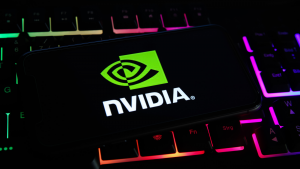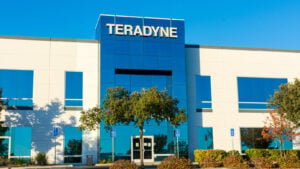The buzz surrounding generative artificial intelligence (AI) this year is shining a spotlight on the broader AI industry, which is ripe with potential for early investors. In the area of robotics, the synergy with AI is revolutionizing the field. So, today, we’ll look at some of the top robotic stocks to buy for long-term returns.
According to Statista, the worldwide robotics market is projected to hit $34.9 billion this year and grow at a compound annual rate of 5.5% through 2027, reaching $43.3 billion. As the world embraces robotics, demand for sophisticated, intelligent systems will continue to skyrocket, laying the groundwork for massive long-term growth in the space.
For risk-taking investors seeking lucrative opportunities, here are some of the best robotic stocks to buy.
| IRTC | iRhythm Technologies | $130.77 |
| NVDA | Nvidia | $267.58 |
| TER | Teradyne | $100.75 |
iRhythm Technologies (IRTC)

iRhythm Technologies (NASDAQ:IRTC), the maker of the Zio heart rate monitor, has seen its shares soar roughly 40% so far in 2023. The wearable device detects irregularities in heart rhythm, collecting data that allows healthcare professionals to make more effective decisions. In doing so, it can help prevent hospitalizations, serious cardiac events and deaths.
Its business has been remarkably consistent, with revenue growth averaging 29% a year over the past five years. In 2022, the company generated $410.9 million in revenue, up 27.3%. While it reported adjusted EBITDA of -$11.3 million, this was an improvement over 2021, and gross margin improved 238 basis points to 68.5%.
Management is forecasting 16% to 18% revenue growth this year. Moreover, they believe iRhythm Technologies could grow to a $1 billion company by 2027.
The stock has performed remarkably well over the years. Since going public in October 2016 at $17 a share, IRTC has risen nearly 670%. Currently, shares trade at 9.8 times sales, 23% below its five-year average.
Nvidia (NVDA)

Nvidia (NASDAQ:NVDA) is no stranger to innovation, with its robust graphics processing units (GPUs) revolutionizing numerous industries. Robotics is no exception, requiring rapid computational abilities to meet the demands of cutting-edge systems.
Enter NVIDIA’s Jetson computing platform, tailor-made for artificial intelligence and robotics applications. The platform offers the computational power needed to drive AI and machine learning algorithms, empowering robots to tackle complex tasks with ease.
As the robotics industry continues to expand, it should only serve to enrich Nvidia’s already impressive growth narrative. While revenue only rose slightly to $27 billion in the most recent fiscal year, ended in January, growth has averaged 23% a year over the past five years. Analysts are forecasting revenue will increase 11% in the current fiscal year and 24% the following year.
With its tentacles in various businesses, Nvidia investors can expect sustained outperformance over the long term.
Teradyne (TER)

Teradyne (NASDAQ:TER) is an industrial equipment designer that has made massive strides in the sector by automating repetitive tasks. Its products accelerate the testing and verification process across multiple industries. Moreover, Teradyne persistently refines and improves its robotic equipment, ensuring its technology remains at the forefront of industrial automation.
Teradyne’s duopoly with Advantest (OTCMKTS:ATEYY) in the semiconductor testing space provides both companies with stable revenue and reasonable pricing. This commanding market position allows both companies to wield significant influence over a sector poised to grow at a compound annual rate of 5.5% through 2030 to $45 billion.
While revenue declined in 2022, it has averaged nearly 11% over the past five years. Analysts are forecasting revenue will drop 10% this year before growth resumes in 2024, with revenue projected to rise nearly 24%. What’s more, EBITDA and net income margins are in line with historical averages despite the slowdown in top-line expansion.
Patient investors could be well rewarded as Teradyne continues to benefit from its dominant position in the market.
On the date of publication, Muslim Farooque did not have (either directly or indirectly) any positions in the securities mentioned in this article. The opinions expressed in this article are those of the writer, subject to the InvestorPlace.com Publishing Guidelines.
